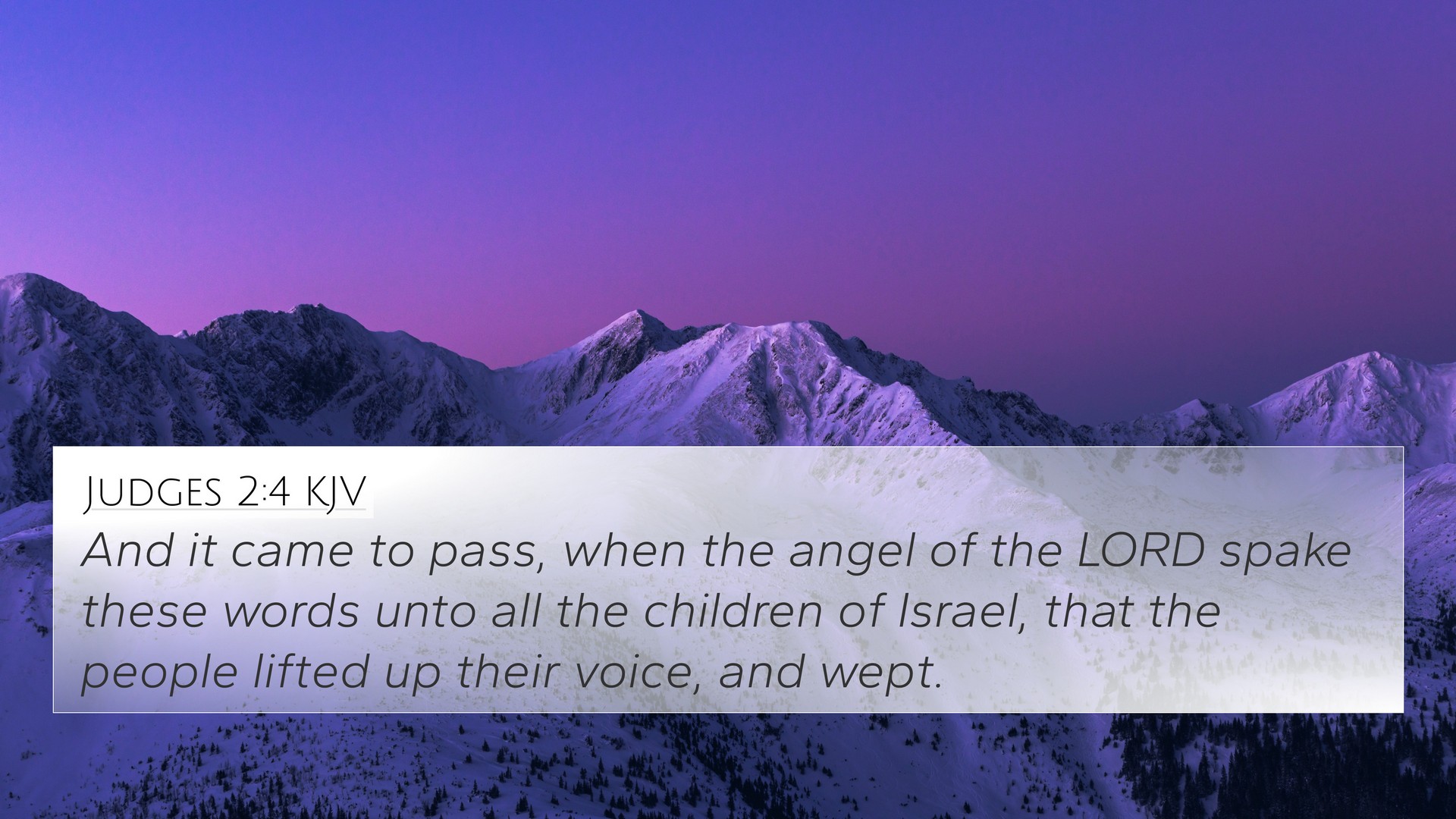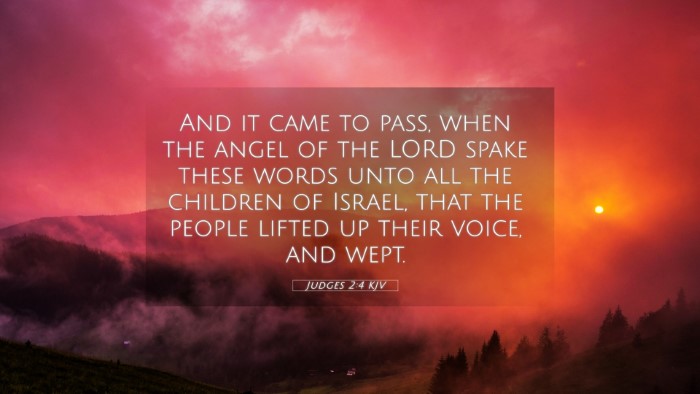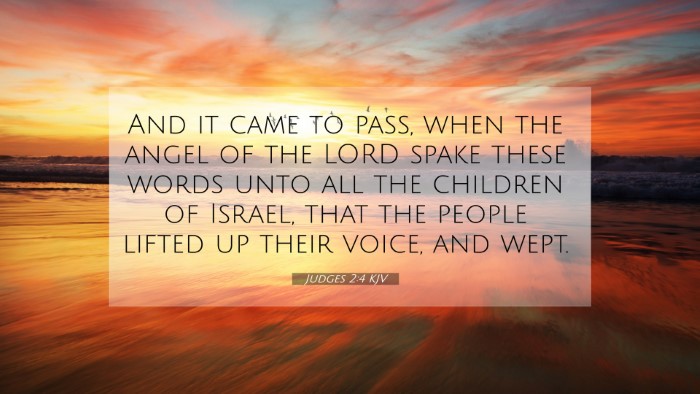Old Testament
Genesis Exodus Leviticus Numbers Deuteronomy Joshua Judges Ruth 1 Samuel 2 Samuel 1 Kings 2 Kings 1 Chronicles 2 Chronicles Ezra Nehemiah Esther Job Psalms Proverbs Ecclesiastes Song of Solomon Isaiah Jeremiah Lamentations Ezekiel Daniel Hosea Joel Amos Obadiah Jonah Micah Nahum Habakkuk Zephaniah Haggai Zechariah MalachiJudges 2:4 Similar Verses
Judges 2:4 Cross References
And it came to pass, when the angel of the LORD spake these words unto all the children of Israel, that the people lifted up their voice, and wept.
Uncover the Rich Themes and Topics of This Bible Verse
Listed below are the Bible themes associated with Judges 2:4. We invite you to explore each theme to gain deeper insights into the Scriptures.
Judges 2:4 Cross Reference Verses
This section features a detailed cross-reference designed to enrich your understanding of the Scriptures. Below, you will find carefully selected verses that echo the themes and teachings related to Judges 2:4 KJV. Click on any image to explore detailed analyses of related Bible verses and uncover deeper theological insights.
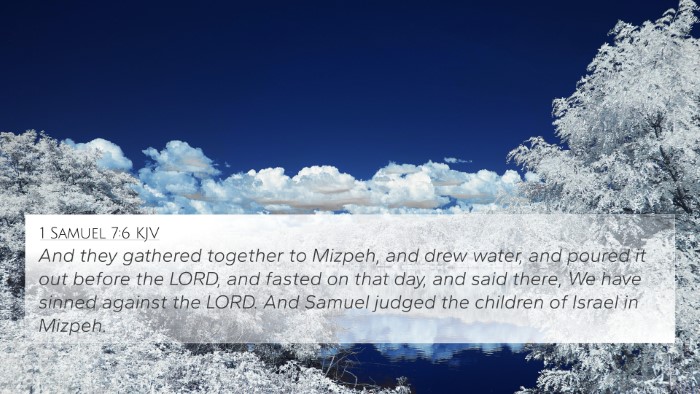
1 Samuel 7:6 (KJV) »
And they gathered together to Mizpeh, and drew water, and poured it out before the LORD, and fasted on that day, and said there, We have sinned against the LORD. And Samuel judged the children of Israel in Mizpeh.
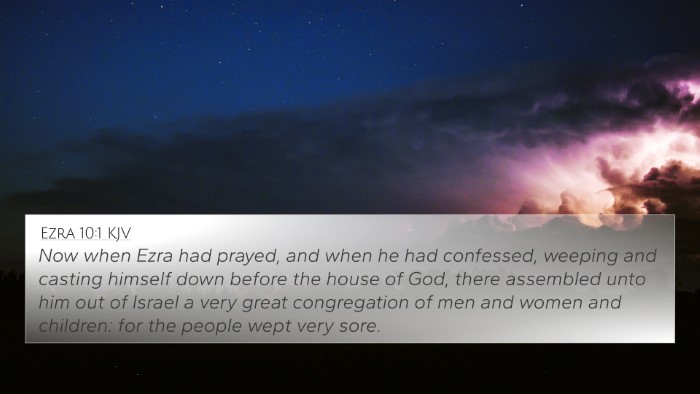
Ezra 10:1 (KJV) »
Now when Ezra had prayed, and when he had confessed, weeping and casting himself down before the house of God, there assembled unto him out of Israel a very great congregation of men and women and children: for the people wept very sore.
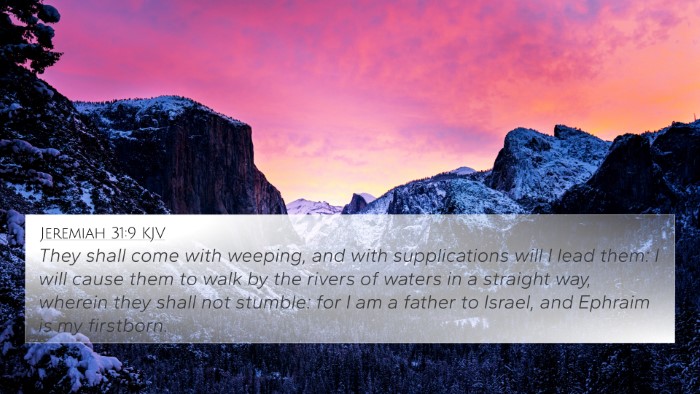
Jeremiah 31:9 (KJV) »
They shall come with weeping, and with supplications will I lead them: I will cause them to walk by the rivers of waters in a straight way, wherein they shall not stumble: for I am a father to Israel, and Ephraim is my firstborn.

Zechariah 12:10 (KJV) »
And I will pour upon the house of David, and upon the inhabitants of Jerusalem, the spirit of grace and of supplications: and they shall look upon me whom they have pierced, and they shall mourn for him, as one mourneth for his only son, and shall be in bitterness for him, as one that is in bitterness for his firstborn.
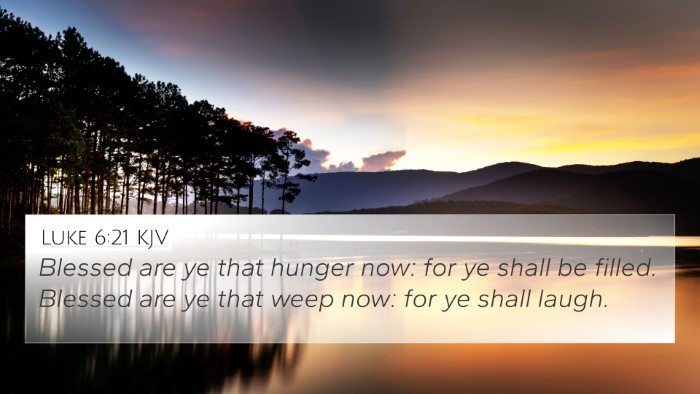
Luke 6:21 (KJV) »
Blessed are ye that hunger now: for ye shall be filled. Blessed are ye that weep now: for ye shall laugh.

Luke 7:38 (KJV) »
And stood at his feet behind him weeping, and began to wash his feet with tears, and did wipe them with the hairs of her head, and kissed his feet, and anointed them with the ointment.
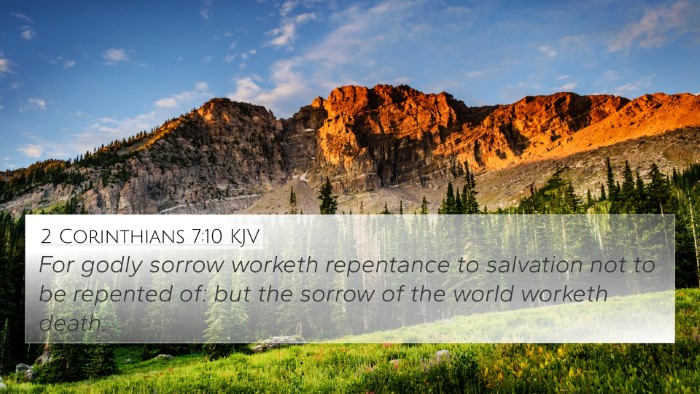
2 Corinthians 7:10 (KJV) »
For godly sorrow worketh repentance to salvation not to be repented of: but the sorrow of the world worketh death.

James 4:9 (KJV) »
Be afflicted, and mourn, and weep: let your laughter be turned to mourning, and your joy to heaviness.
Judges 2:4 Verse Analysis and Similar Verses
Understanding Judges 2:4
Judges 2:4 states:
"And it came to pass, when the angel of the Lord spake these words unto all the children of Israel, that the people lifted up their voice and wept."
Summary of Meaning
This verse marks a pivotal moment in the Book of Judges, highlighting a transition in the Israelites' relationship with God following the death of Joshua and the elders who outlived him. The angel of the Lord delivers a message that stirs the emotions of the people, prompting them to respond with weeping. It encapsulates a theme of mourning for their forsaking of God and the covenant He established with them.
Commentary Insights
Matthew Henry's Commentary
Matthew Henry points out that the appearance of the angel signifies God’s presence among His people, even in moments of their disobedience. The Israelite's reaction is a heartfelt acknowledgment of their failures, emphasizing the importance of divine conviction in bringing about repentance. Henry notes that their weeping reflects a communal acknowledgment of their waywardness and a longing for restoration in their covenant relationship with God.
Albert Barnes' Commentary
Albert Barnes expounds on the significance of the angel of the Lord speaking to the Israelites. He interprets this event as an act of divine love, where God communicates His disappointment with Israel’s unfaithfulness while simultaneously giving them an opportunity to return. He argues that their weeping is indicative of both remorse and the beginning of a journey towards repentance. This acknowledgment of sorrow is essential for spiritual renewal and restoration.
Adam Clarke's Commentary
Adam Clarke emphasizes the historical context of this verse. He discusses the transition from the leadership of Joshua to a time when Israel lacks strong guides, which leads to spiritual decline. Clarke suggests that the weeping signifies more than mere sadness; it indicates a profound recognition of God’s displeasure and a desire for His guidance. The emotional response to the angel’s words serves as a paradigm for understanding Israel’s cyclical struggles with faithfulness to God.
Bible Verse Cross-References
- Exodus 34:14 - "For you shall worship no other god, for the Lord, whose name is Jealous, is a jealous God."
- Judges 10:10 - "And the children of Israel cried unto the Lord, saying, We have sinned against thee."
- 1 Samuel 7:6 - "And they gathered together to Mizpeh, and drew water, and poured it out before the Lord, and fasted on that day."
- 2 Chronicles 7:14 - "If my people, which are called by my name, shall humble themselves, and pray, and seek my face."
- Psalm 51:17 - "The sacrifices of God are a broken spirit; a broken and contrite heart."
- Hosea 6:1 - "Come, and let us return unto the Lord: for he hath torn, and he will heal us."
- Matthew 5:4 - "Blessed are they that mourn: for they shall be comforted."
Thematic Bible Verse Connections
The themes presented in Judges 2:4 resonate throughout both the Old and New Testament, reaffirming the importance of repentance and divine interaction. The emotional response of the Israelites serves as a powerful reminder of God's desire for His people to acknowledge their missteps and seek realignment with His will.
Conclusion
Judges 2:4 is not merely a historical account; it reflects the ongoing dialogue between God and His people regarding faithfulness and repentance. This verse serves as an essential anchor for understanding the cyclical nature of Israel's relationship with God, emphasizing that recognition of sin is the first step toward restoration. The insights gathered from the public domain commentaries, along with corresponding Scripture cross-references, provide a deeper understanding of this pivotal moment in Biblical history.
Additional Resources for Bible Cross-Referencing
- Tools for Bible Cross-Referencing: Consider using a Bible concordance for thorough study.
- Bible Cross-Reference Guide: Helpful for finding connections in scripture.
- How to Use Bible Cross-References: Engage with the text interactively.
- Bible Chain References: Explore thematic connections across different books.
- Cross-Referencing Bible Study Methods: Employ various methods for deeper understanding.
